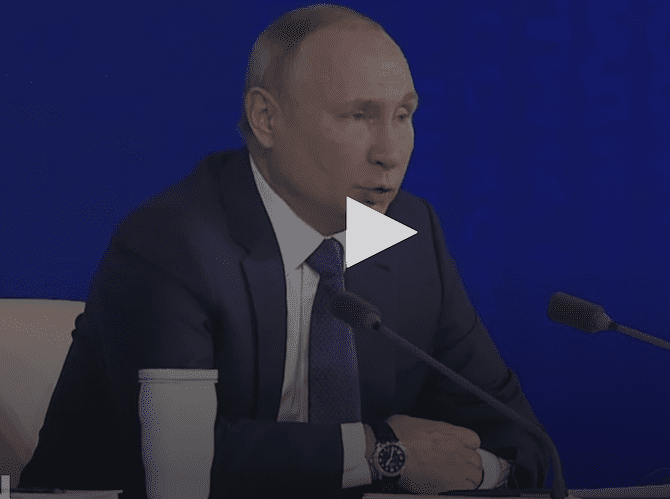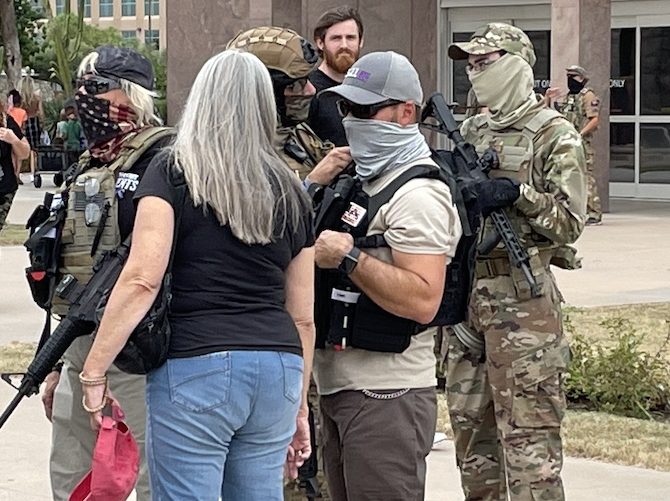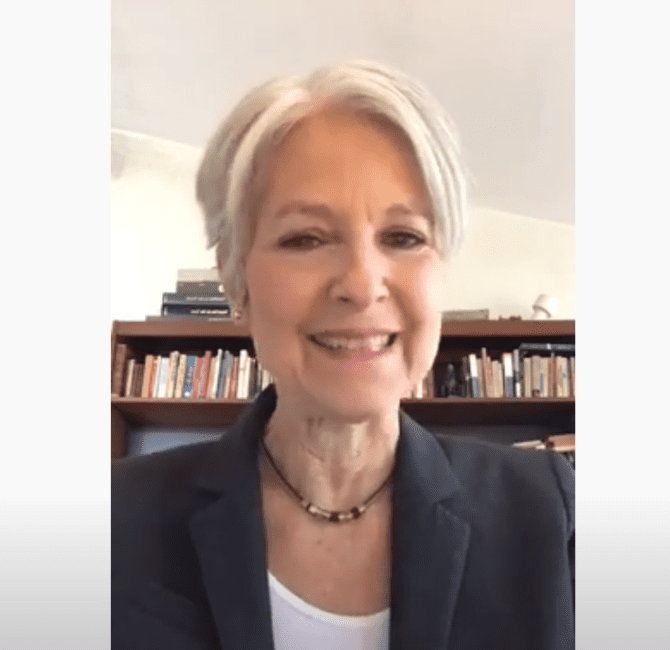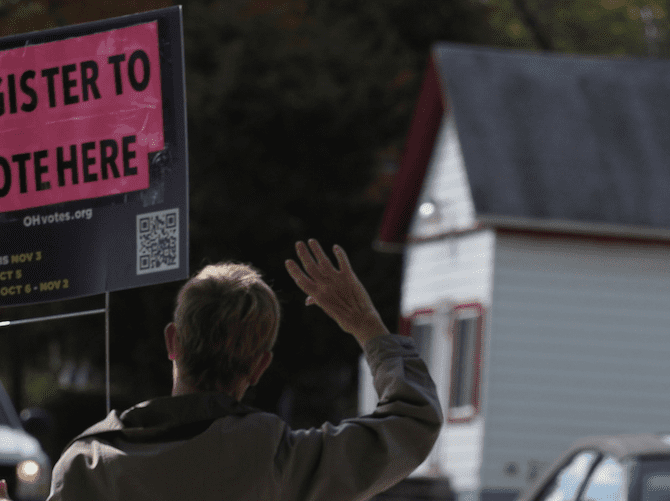Hillary Clinton Lays Out the 4 Big Threats to Democracy and the 2020 Elections at Speech to Major Conference
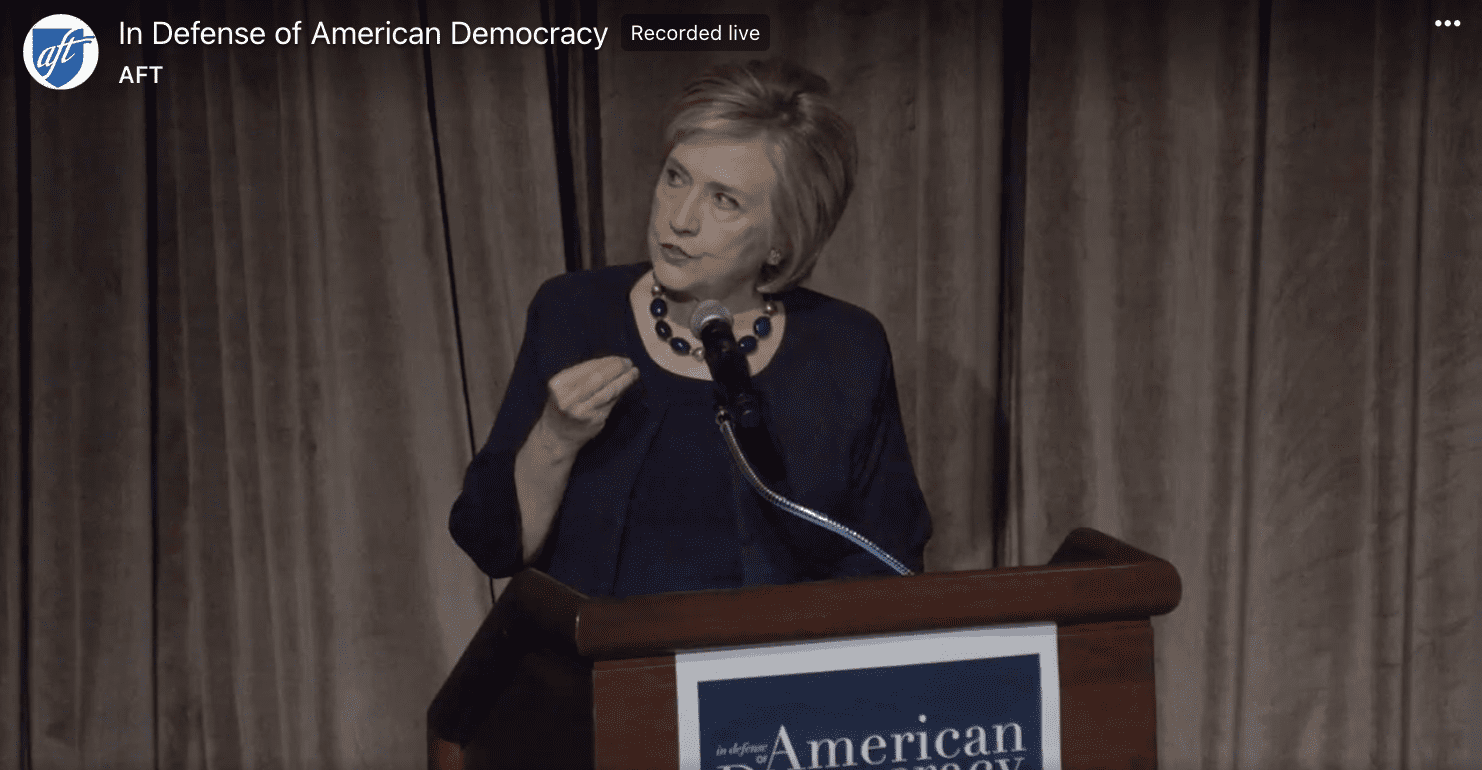
(Hillary Clinton addressing AFT conference. Photo Credit/https://www.facebook.com/watch/live/?ref=watch_permalink&v=483383965724702)
Hillary Clinton warned that American elections are under escalating assault from domestic and foreign forces threatening the right to vote on Tuesday in a far-ranging speech delivered at the In Defense of Democracy conference in Washington, D.C. (Video of her full speech is embedded below.)
“I really believe we are at a moment of national soul-searching,” said the 2016 Democratic Party presidential candidate and ex-secretary of state at a forum on civic participation organized by the American Federation of Teachers. “We stand at a crossroads of our own, a crisis in democracy. Racist and white supremacist views are lifted up in the media and in the White House. Hard-fought-for civil rights are being stripped back. The rule of law is being undermined. The norms and institutions that provide the foundation of our democracy are under assault.”
In her speech, Clinton detailed how partisan Republicans have hijacked the rules that govern electoral participation to seize and hold power in a manner that echoes infamous authoritarian rulers. She pointed to a catalog of voter suppression laws newly resurrected in states dominated by Republicans. The impact of those tactics, she said, is magnified by online partisan propaganda and foreign intervention.
“We are witnessing a deliberate and ongoing effort to undermine the integrity of our elections, and to silence the voices of millions of Americans, particularly young people, the elderly, women, and people of color,” said Clinton. “And this isn’t just about 2016 or even 2018. It’s about 2019, 2020, and every election after that. Because as the teachers in this room know so well, if we don’t learn the lessons of the past, we are doomed to repeat history.”
Clinton called out the tactics used by Republican governors and legislatures, from stricter voter ID laws, voter roll purges, fewer voting options and backlogs in processing voter registrations to poor election administration. The result is to disenfranchise hundreds of thousands of voters in Wisconsin, Michigan, and many other states.
Such tactics, she said, “were literally made up for the purpose of preventing certain people from actually being able to cast a vote that would be counted. We saw fewer voting places, long lines, and malfunctioning equipment, again, in certain places [where blue-leaning voters predominated]. … That is no accident. It is in service to their larger political goals of obtaining and keeping power.”
“Just think about what happened last week,” she went on, “when President Trump went to North Carolina on the eve of a special election—an election that had to be redone as a direct result of Republican cheating—he didn’t condemn that, of course. Instead, he claimed again that [pro-Clinton] voter fraud was rampant in 2016.”
“Sometimes it’s hard to process all of this because he lies so much. But let that sink in,” Clinton said. “The president of the United States is lying to Americans to delegitimize the democratic process. Yes, of course, it’s abhorrent. It’s delusional. But it’s also strategic. And that should bother every one of us.”
Four Warnings About 2020
Clinton spoke most fervently about the advice she is giving to Democratic presidential candidates. After answering their questions, said Clinton, she would end those conversations by citing four trends that would threaten their candidacies: voter suppression, hacking, fake news, and cybersecurity.
“Let me tell you what I think the biggest obstacle might very well turn out to be,” Clinton said, recounting her talks with 2020 Democratic hopefuls. “You can run the best campaign. You can have the best plans. You can get the nomination. You can win the popular vote. And you can lose the Electoral College and therefore the election for these four reasons: number one, voter suppression.”
“We saw what happened in Georgia, where Stacey Abrams should be governor of that state,” she said, referring to the 2018 election. “Registered voters were kept off the rolls. Their registrations just piled up in some back office with no intention to ever enroll them so that they could actually vote.”
Next, Clinton cited the Republican-run state of Wisconsin.
“We also saw what happened in 2016. Experts estimate that anywhere from 27,000 to 200,000 Wisconsin citizen voters, predominantly in Milwaukee, were turned away from the polls,” she continued. “They showed up, but maybe they didn’t have the correct form of identification. Maybe the name on their driver’s license included a middle name or an initial that wasn’t on their voter registration. But officials made every excuse in the book to prevent certain people from voting in that election.”
Purges—or preemptively removing otherwise eligible registered voters from rolls—was “another form of voter suppression,” she said, noting that 12 million voters were purged from 2012 to 2016.
“They were purged in Wisconsin, in Michigan, in Ohio, in Florida, in other places,” Clinton said, citing key presidential swing states. “And when you have a Republican-controlled state government, as we did in those states back in 2016, it’s practically impossible—in fact, I’ll say it is impossible—to fight back, let alone to stop, that very deliberate form of [voter] suppression.”
The second threat facing 2020 candidates, Clinton said, was hacking—or breaking into, stealing, and possibly manipulating data and other records. In 2016, Russian spies broke into Democratic National Committee computers and took strategy documents and also stole her senior staff’s emails. The action was this century’s version of the 1970s Watergate break-in of DNC offices by aides of then-president Richard Nixon, a Republican. Unlike Watergate, the stolen materials were published widely and became fodder for incessant attacks on her candidacy.
“I tell every candidate, ‘if you have not had your personal and campaign emails hacked, they will be. So will the emails of people working for you,’” Clinton said. “‘Your information will be stolen and then weaponized against you in the most pernicious ways. Remember Pizzagate? WikiLeaks?’”
Pizzagate referred to a right-wing conspiracy theory that she was running a human trafficking and child sex ring from a Washington pizza parlor, according to supposedly coded messages in the stolen emails. Far-right online media provoked a North Carolina man to drive to the District of Columbia and fire an assault rifle at the restaurant. WikiLeaks is where DNC and Clinton campaign documents stolen by Russian spies were published.
“Cybersecurity is an essential component of protecting our democracy, but it’s very difficult for campaigns on their own to be able to do that,” she said. “You need a national commitment to cybersecurity. And as many cyber experts have already told us, that [national defense] just doesn’t exist. And there is no real effort being made to install such a system that will protect voters.”
Clinton was referring to the refusal by the Trump White House and Senate Majority Leader Mitch McConnell to acknowledge Russian meddling in 2016, as detailed in the report by Special Counsel Robert Mueller, and to take additional steps to secure computer systems managing America’s election infrastructure.
She cited academics who described how the “hacking, stealing, weaponizing information was so impactful [in 2016]. And it will be again. And we will have to hope that not only candidates, but the press and the public, will be able quickly to discredit what is being presented. And we won’t face the horrible kinds of outcomes we saw before, where people believed Pizzagate.”
Clinton continued with the third trend that she said would threaten any Democratic candidate: deliberately fake news posted online, especially on giant platforms such as Facebook that won’t delete it. She singled out deceptively edited videos called “deep fakes.”
“Remember what happened to Nancy Pelosi a few months ago?” she asked. “Somebody spliced words from different presentations, put them together and presented them as though it were real. And think how hard it was to convince the major tech platforms, who admitted it was fake, to take it down. Some did, but many did not. And their answer—in particular, Facebook’s answer—was, ‘Well, we’re going to let people decide for themselves.’ How can you decide for yourself when what is presented is blatantly false and manufactured?”
That trend has continued on Facebook, Clinton said, pointing to an uptick in Trump campaign misinformation—specifically, paid ads that “violate Facebook’s stated terms of service, [but] they’re still up.”
The final threat that 2020 candidates will face, according to Clinton, is “the lack of security in our election system itself,” she said. Russia’s attacks were wider than has been acknowledged, she said, citing the White House’s reluctant admission that voting systems in two Florida counties were breached before November 2016.
“We actually know that it is more, but they won’t admit that,” she said. “Rep. Stephanie Murphy [D-FL], gave an incredible statement the other day, saying, ‘I have been briefed, along with my Republican colleagues, about what actually happened in Florida, but I am prohibited from telling you.’ Think about that. A direct assault by a foreign adversary on a state’s election system—and citizens of that state and our country can’t know about it? Can’t know the details? How are we to protect ourselves?”
The Mueller Report said Russia had “interfered in the 2016 election in a sweeping and systematic fashion,” Clinton noted. “I don’t think ‘sweeping and systematic’ describes two counties in Florida.” She also cited election infrastructure—the voting and counting systems—as inadequately protected to counter current threats.
“In recent years we’ve seen practices that should concern us all: from remote access software installed in election management systems to ballot scanners that connect to the internet, opening them up to potential hacking,” Clinton said, quoting voting rights activists. “So this is a both-sides problem. It is a problem of a foreign adversary actually interfering, hacking, and it is a problem of our own decisions about what kinds of equipment and systems we are going to employ. Both of those deserve the most serious attention.”
All of these threats challenge the very basis of American elections, Clinton said, which starts with exercising the right to vote. But Republican Party leaders won’t place the national interest ahead of their party and its tactics to retain power. At the federal level, both McConnell and Trump were “abdicating their responsibility to protect and defend the Constitution,” she said, citing their oath of office.
A Deepening Crisis
Today’s Republican Party leaders remind Clinton of history’s authoritarians, whose legacy she encountered as President Obama’s secretary of state.
“We used to have a phrase about authoritarian leaders who would be originally elected or appointed pursuant to the rules of election, like [Benito] Mussolini, like [Adolf] Hitler,” she said. “We would say about them that they believed in elections, all right—that they believed, ‘One and you’re done.’ Get in. Change the rules to perpetuate your own power, to grow your own authoritarian rule.”
The only response to these threats was reasserting the right to vote and taking back representative political power through voting, she said. While the task is formidable, Clinton said she feels encouraged because many people clearly saw the stakes.
“The right to vote powers every change we seek, every future we envision,” Clinton said. “Because the ability to choose who represents us, getting the accurate information we need to be informed, and protecting us from the weaponization of information and misinformation, they’re all critical to making sure we can get things done to make progress together.”
“I think it means everything,” she said of the right to vote and casting a ballot that is counted. “It’s why the forces of corruption and power, ideology, and dominance at home and abroad are trying to distort and undermine our values, our trust, and confidence in ourselves and in each other.”
Also Available on: www.nationalmemo.com



